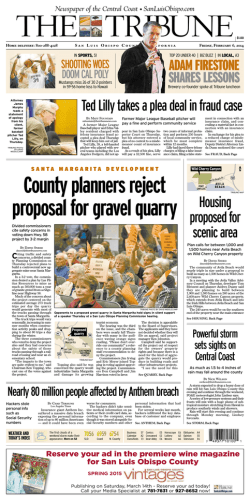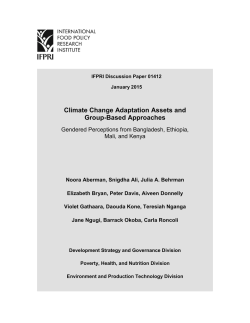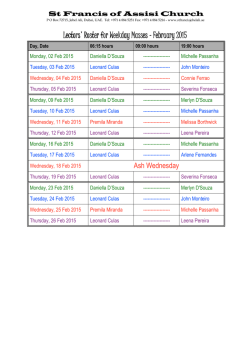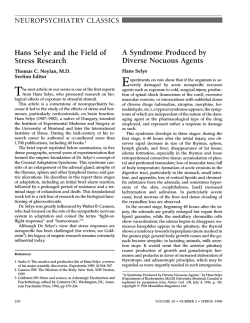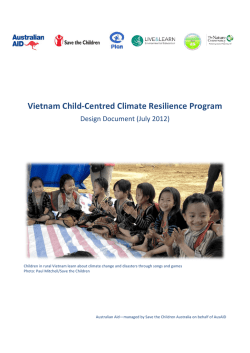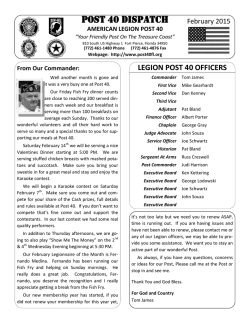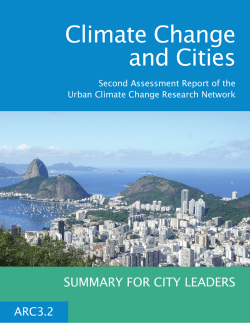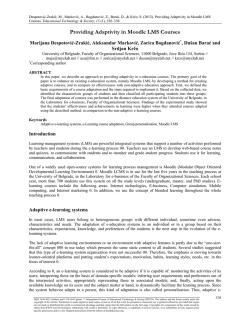
Draft Concept Note and Agenda rev 160115
Draft Concept Note and Agenda Inception meeting Addressing Water Security: Climate Impacts and Adaptation responses in Africa, Asia and the Americas (With the support from Flanders Trust Fund for Science) Paris, 9-10 February 2015 Bonvin Building – Room/Salle XIV Organized by UNESCO-IHP The inception meeting is organized with potential partners to discuss and design activities within the framework of the project “Addressing Water Security: Climate Impacts and Adaptation responses in Africa, Asia and Americas”. The framework and objectives of the project will be presented and partnership mechanisms and ideas for potential joint projects will be discussed and developed. The inception meeting will contribute to UNESCO’s IHP-VIII (2014-2021) Phase entitled “Water Security: responses to local, regional and global challenges”. The inception workshop will gather hydrologists, water resources experts, policymakers, IHP network, UN institutions and other stakeholders. The 2-days meeting will help further develop mechanisms and ideas for identifying potential collaboration and action plan with the participating experts and institutions. The inception meeting aims at launching a discussion on a global knowledge forum on water security by building on already established networks, know-how and experiences. The specific objectives consist in developing partnership mechanism and projects which will contribute to the assessment of vulnerability and to map existing implementation of adaptation strategies in vulnerable regions. Furthermore, the goal is raising awareness on potential impacts of climate change on water resources by benefiting from experience of experts and different case studies on effective adaptation strategies. Programme 9th February 09h00-09h30 Opening Session Chair: Mr Siegfried Demuth Rapporteurs: Mr Koen Verbist, Mr Bruno Freire de Souza Opening remarks by Ms Flavia Schlegel, Assistant Director-General for Natural Sciences, UNESCO (TBC); Ms Blanca Jimenez Cisneros, Director of the Division of Water Sciences, UNESCO; Mr Rudy Herman, Representative of Flanders UNESCO Science Trust Fund (FUST) 09h30-10h00 Addressing Water Security: Climate Impacts and Adaptation responses in Africa, Asia and the Americas Session Chair: Mr Siegfried Demuth Rapporteurs: Ms Barbara Avila, Mr Bhopal Pandeya (TBC) General overview of the project and expectations of the meeting by Mr Anil Mishra and Mr Koen Verbist. 10h-10h30 Coffee Break 10h30-12h30 Keynotes: global challenges Session Chair: Mr Siegfried Demuth Rapporteurs: Mr John Pomeroy, Mr Bruno Freire de Souza Water Security – Mr Robert Varady, Water Security Network Vulnerability Assessment – Mr Wouter Buytaert, Imperial College Science-policy Interface – Mr John Matthews, Alliance for Global Water Adaptation (AGWA) 12h00-13h30 Lunch 13h30-14h30 Case studies, initiatives and linkages - Session I Moderator: Mr Rudy Herman Rapporteur: Mr Koen Verbist, Ms Barbara Avila Speakers (10’ presentation each): Mr John Pomeroy, Global Energy and Water Exchanges Project (GEWEX) Ms Jane Gerardo-Abaya, International Atomic Energy Agency (IAEA) Mr Robert Varady, Water Security Network Mr Matthias Jurek, United Nations Environment Programme (UNEP) Mr Vladimir Mamaev, United Nations Development Programme (UNDP) Mr Samuel Nussbaumer, World Glacier Monitoring Service (WGMS) 14h30-15h00 Discussion 15h00-15h30 Coffee Break 15h30-16h30 Case studies, initiatives and linkages - Session II Moderator: Mr Robert Varady Rapporteurs: Ms Sofia Widforss, Mr Bruno Freire de Souza Speakers (10’ presentation each): Mr Patrick Ginot, Institut de Recherche pour le Développement (IRD) Ms Elma Montaña, Inter-American Institute for Global Change Research (IAI) Mr Marcus Wijnen, World Bank Mr Sam Kanyamibwa, Abertine Rift Conservation Society (Arcos) Ms Ines Navarro Gonzáles, Mexican National Autonomous University (UNAM) / Mexican National Commission of Water (CONAGUA) Mr. Raimund Mair, International Commission for the Protection of the Danube River (ICPDR) 16h30-17h00 Discussion 17h00-17h50 Case studies, initiatives and linkages - Session III Moderator: Mr John Pomeroy Rapporteurs: Mr Matthias Jurek, Ms Barbara Avila Speakers (10’ presentation each): Mr Manfred Spreafico, UNESCO International Sediment Initiative (ISI) Mr Yao Tandong, Institute of Tibetan Plateau Research Mr Cesar Carmona-Moreno, European Commission Joint Research Centre (JRC) Mr Miguel Saravia, Consortium for the Sustainable Development of the Andean Ecoregion (CONDESAN) Ms Tina Schoolsmeester, GRID-ARENDAL 17h50-18h20 Discussion End of the day 10th February 09h00-09h30 Contribution from UNESCO Category II Centres and Chairs Session chair: Mr Siegfried Demuth Rapporteurs: Mr Bruno Freire de Souza, Mr Bhopal Pandeya (TBC) Speakers (5’ presentation each): Mr William Logan, International Center for Integrated Water Resources Management (ICIWaRM), USA Mr Igor Severskiy, Central Asian Regional Glaciological Centre, Kazakhstan Mr Gabriel Mancilla, Water Center for Arid and Semi-Arid Zones in Latin America and the Caribbean (CAZALAC), Chile Mr Helmut Habersack, Chair on Integrated River Research and Management - University of Natural Resources and Life Sciences, Austria Mr Johannes Cullmann, International Centre for Water Resources and Global Change, Germany 09h30-11h00 Vulnerability assessment Moderator: Mr Wouter Buytaert Rapporteurs: Mr Koen Verbist, Ms Barbara Avila Panelists: Mr. Miguel Saravia, CONSEDAN Mr Sam Kanyamibwa, ARCOS Mr Matthias Jurek, UNEP Ms Tina Schoolsmeester, GRID-ARENDAL The group will discuss and assess vulnerability and capacity across the regions to establish a baseline and develop 3 - 5 recommendations, and project action plan possibly along the following lines: • • • • • Identification of land use changes and socio-economic conditions as a result of climate change; Identification of most vulnerable communities and groups; Key determinants of vulnerability and challenges for adaptive capacity; Implementation of Adaptation Strategies and Climate Risk Management in pilot areas; Awareness raising among local stakeholders on potential water security risks. 11h00-11h30 Coffee Break 11h30-13h00 Science-policy for adaptation and awareness raising Moderator: Mr John Matthews Rapporteurs: Ms Sofia Widforss; Mr Bruno Freire de Souza Ms Elma Montaña, IAI Mr Rudy Herman, FUST Ms Ines Navarro Gonzales, Mexican National Commission of Water (CONAGUA) Mr Robert Varady, Water Security Network Mr Wouter Buytaert, Imperial College Mr. Marcus Wijjnen, WB The Group will discuss policy and national framework conditions and review future national strategies and their relevance to community and develop 3 - 5 key recommendations and action plan, possibly along the following lines: • • • • • Review current and future national adaptation strategies and their relevance to community level; Effective strategies and pilot case studies of how scientific results can be leveraged into policies; Policy impact analysis and policy changes; Constraints for policy implementation; Opportunities for policies at the national and regional levels. 13h00-14h30 Lunch 14h30-16h30 Improving Communication between multi-stakeholders Moderator: Mr Anil Mishra Rapporteurs: Ms Barbara Avila; Mr Bhopal Pandeya (TBC) Mr Vladimir Mamaev, UNDP Mr John Pomeroy, GEWEX Mr Raimund Mair, ICPDR Mr Cesar Carmona, Excellence Center in LAC of the European Commission's Joint Research Center (RALCEA-JRC) Mr John Matthews, AGWA The Group will discuss communication strategy involving multi-stakeholders to improve science communication to better convey science messages and effectively reach various audiences particularly policymakers - to promote the process of converting science knowledge into action. The aim is to provide effective and relevant adaptation strategies for the community and develop 3 - 5 key recommendations and action plan, possibly along the following lines: • • • Provide strategic reviews of the current-state-of-the-art of the science communication associated with the climate change adaptation; Depth discussion about how the messages have moved from the science sphere to the policy and public domains; Review some effective awareness raising and communication strategies related with the impact of climate change on water resources, and discuss what is/should be the role of scientists in this process; 16h30-17h00 Coffee Break 17h00-17h30 Closing of the meeting The outputs of the workshop will drafted based on the moderators and rapporteurs contributions.
© Copyright 2026
